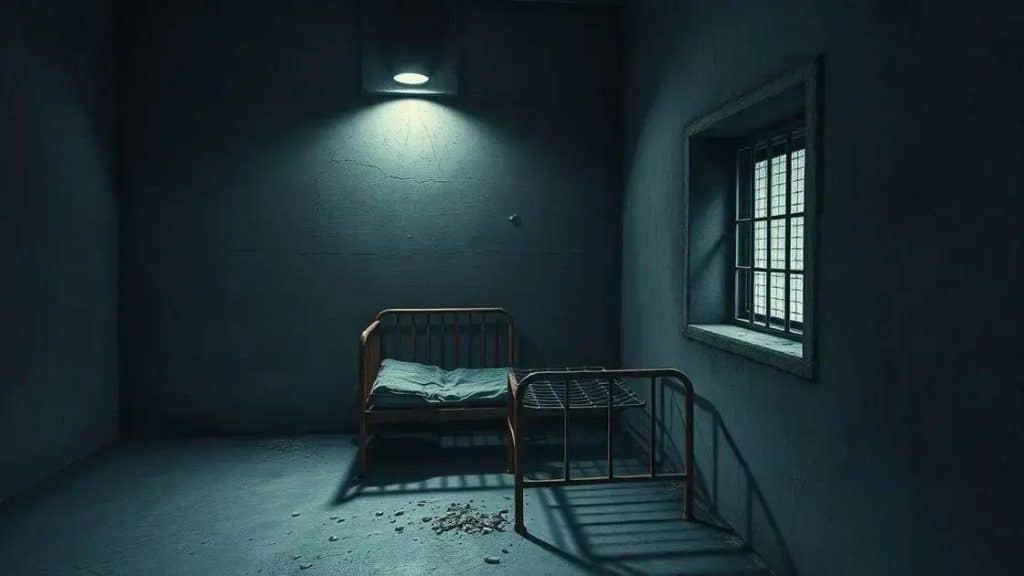Prison conditions condemned by advocacy groups spark outrage

Anúncios
Prison conditions condemned by advocacy groups highlight severe issues such as overcrowding, inadequate healthcare, and lack of rehabilitation, emphasizing the urgent need for reform to uphold inmates’ human rights.
Prison conditions condemned by advocacy groups often highlight serious concerns regarding the treatment and living situations of inmates. Why should we care? These conditions not only affect the individuals inside but ripple through society, influencing perceptions of justice and rehabilitation.
Anúncios
Understanding prison conditions in various countries
Understanding prison conditions in various countries is vital as it reflects a nation’s commitment to human rights. Different places use varied systems and policies, leading to distinct environments for inmates. Exploring these differences can shed light on broader social issues.
Common Challenges Faced by Inmates
In many regions, inmates suffer from inadequate resources. They often deal with overcrowded facilities, limited access to healthcare, and insufficient nutrition. These factors lead to severe mental and physical health problems. Moreover, the treatment they receive can influence their rehabilitation opportunities.
Anúncios
- Overcrowded prisons affect living conditions.
- Access to healthcare is often restricted.
- Food quality and quantity may be inadequate.
- Physical abuse and violence are prevalent.
These conditions can vary significantly based on geographical and political contexts. Some countries have made substantial efforts to reform their prisons, aiming for humane treatment of inmates. For instance, Scandinavian countries have implemented systems focusing on rehabilitation rather than punishment, resulting in more positive outcomes for convicts.
Prison System Reforms and Their Benefits
Reforming prison systems not only aids inmates but also benefits society as a whole. Effective rehabilitation programs can reduce recidivism rates. By providing education and vocational training, former inmates are better equipped to reintegrate into society, lowering the likelihood of reoffending. Countries such as Norway have seen success with this approach, showcasing the positive impact of humane treatment.
In contrast, nations with harsher practices often face ongoing issues. Recidivism rates remain high, and societal safety can be compromised. It highlights the need for a shift in perspective regarding prison conditions. Viewing inmates as individuals deserving of support may lead to long-term improvements.
Human rights implications of poor prison conditions

The human rights implications of poor prison conditions are significant and concerning. When prisons fail to offer adequate living spaces, healthcare, and safety, they violate basic human rights. This not only affects inmates directly but also impacts society as a whole.
Impact on Inmate Well-Being
Poor prison conditions lead to mental and physical health challenges for inmates. Many experience anxiety, depression, and other mental health disorders due to overcrowding and lack of support. These conditions create a bleak environment where rehabilitation is nearly impossible, trapping inmates in a cycle of despair.
- Limited access to medical care exacerbates health issues.
- Overcrowding increases the risk of violence and abuse.
- Poor sanitation contributes to the spread of diseases.
- Harsh living conditions negatively affect inmate morale.
Additionally, the lack of educational programs can hinder personal development, making it challenging for inmates to reintegrate into society after their release. This situation raises questions about the role of prisons in promoting rehabilitation versus punishment.
Societal Consequences
When prisons do not uphold basic human rights, the consequences extend beyond the walls of correctional facilities. Communities may face increased crime rates as former inmates struggle to adapt after their release. If individuals are released with untreated health issues, they may seek support through crime rather than legal employment.
Moreover, inadequate prison conditions can lead to public outcry and demands for reform. Advocacy groups continuously highlight these issues, pushing for changes that align the prison systems with basic human rights. Addressing these concerns is crucial for building a justice system that truly serves the public and upholds dignity for all individuals.
Advocacy efforts to improve inmate treatment
Advocacy efforts to improve inmate treatment play a crucial role in transforming prison conditions. Various organizations and activists work tirelessly to ensure that inmates’ rights are recognized and respected. These efforts are aimed at addressing the poor conditions that many inmates face and pushing for reforms.
Key Advocacy Organizations
Numerous organizations are dedicated to advocating for inmate rights. They focus on raising awareness and promoting changes in policies. Some notable groups include:
- American Civil Liberties Union (ACLU)
- Human Rights Watch
- The Sentencing Project
- Prison Policy Initiative
These organizations shine a light on systemic issues while pushing for legislative changes. They often work with lawmakers to introduce bills that improve conditions and expand rehabilitative resources for inmates.
Strategies for Advocacy
Advocacy groups utilize various strategies to mobilize support and effect change. Grassroots movements often rally communities to demand better treatment for inmates. They share personal stories and testimonials to illustrate the real impact of prison conditions. Media exposure is another powerful tool. Documentaries and news reports can generate public interest and pressure authorities to act.
Furthermore, many organizations provide support through legal assistance, helping inmates and their families navigate the complex justice system. Educational programs aim to inform the public about inmates’ rights and the importance of humane treatment.
Personal stories from former inmates about conditions

Personal stories from former inmates about conditions provide powerful insights into the realities of prison life. These narratives reveal the struggles and challenges faced daily while incarcerated. By sharing their experiences, former inmates shed light on the harsh conditions that often go unnoticed.
Impact of Overcrowded Facilities
Many former inmates describe their time in overcrowded prisons as overwhelming. Living in cramped spaces can lead to heightened stress and anxiety. One former inmate shared that they often had to sleep on the floor with little personal space. This lack of privacy can create a hostile environment.
- Increased tension among inmates.
- Limited access to essential services.
- Higher likelihood of violence and conflicts.
- Feelings of hopelessness and despair.
Such conditions can severely affect mental health. Inmates often feel isolated and disconnected from the outside world. Personal stories highlight these emotional struggles, revealing how they carry these experiences long after their release.
Healthcare Access Issues
Another common theme in these stories is the difficulty in accessing adequate healthcare. Many former inmates report waiting weeks for medical attention, leading to worsening health conditions. They express frustration with the system that neglects their basic health needs.
One former inmate recounted suffering from untreated injuries, which made prison life even more challenging. These experiences underscore the importance of addressing healthcare disparities within the prison system. When inmates do not receive timely treatment, it can contribute to long-term health problems.
The voices of former inmates are essential in igniting conversations about prison reform. Their experiences emphasize the need for improvements in living conditions, health care access, and mental health support. Ultimately, these narratives can inspire change within the justice system, driving efforts to create a more humane environment for all inmates.
FAQ – Frequently Asked Questions about Prison Conditions and Advocacy
What are the main issues faced by inmates in overcrowded prisons?
Inmates in overcrowded prisons experience heightened stress, increased violence, and limited access to essential services like healthcare.
How do personal stories from former inmates impact advocacy efforts?
Personal stories highlight the real struggles faced by inmates, helping to raise awareness and drive support for necessary reforms.
What role do advocacy organizations play in improving inmate treatment?
Advocacy organizations work to promote awareness, support legislative changes, and provide resources for inmates to ensure their rights are respected.
Why is healthcare access important for inmates?
Timely healthcare access is crucial for treating injuries and illnesses, affecting inmates’ overall well-being and chances of rehabilitation upon release.





